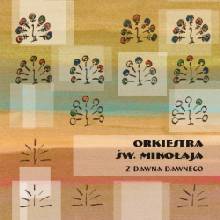discography

From the Far-off Times
(z dawna dawnego)
cd/mc 2000
...For in all this music, as well as in words, a few ancient types can be noticed, which, in spite of the melody bending to newer and newer texts and additions (beside the old ones), like stems or roots that have gathered the moss of antiquity, survived and spread all over the Earth.
Such types give, so to say, a principle, tonality, like the sounds produced by the organs of speech give it to the tongue. From this web, in a given province, in this particular way a thread of melody is drawn out, pulled, and suddenly broken off. Once it is longer, then shorter, fast and lively or slow and drowsy, smooth or rough, from one side to another, but it is always true to its principle.
Having sprung from such a source the melody flows tortuously or straight, like a river, and touching a province on the run, it wedges its waters into the slender and deep bed it has made for itself, or it flows broad and shallow all over the neighbouring greens and shoals; yet the mass of its waters nearly always has the same components, which are saturated - but slowly - with new-come sediment.
From Oskar Kolberg (1814-1890), the father of Polish ethnography , who collected thousands of Polish folk songs and provided them with commentary in several dozen volumes. This particular extract comes from the volume entitled "The Sandomierz Region".
Although these words are more than a hundred years old, they explain very well what we want to achieve in folk music. We do not aim at modernizing the folk archetype, but at adding a sort of continuation to it, which stems both from the contemporary world we live in, and from our knowledge and sensitivity to tradition obtained by thorough studies of folklore. Through this music we want to answer vital questions for us: How to save the world that we now call "folklore"? How to think and speak of it? How to reconcile it with the world we live in?
The Saint Nicholas Orchestra came into existence in 1988 and since 1992 it has been working in "Chatka Żaka", the Academic Centre of Culture at Maria Curie-Skłodowska University in Lublin. The Orchestra gathers people who would like to experience an adventure in folklore.
This record is the fifth album of our discography, after "It's Time to Head Home" devoted to Polish folk music and "The Land of Boyns", summing up our interest in music of the Ruthenians living in the Polish mountains. On our two earlier cassettes - "The Music of the Mountains" and "From the Hill Fields" - one can find more Polish themes and also songs from the Ukrainian Carpathians.
"From the Far-off Times" mainly contains songs from the eastern part of our country, and especially from the Lublin region, where we live. This part of Poland is famous for archaic folk tunes and texts. However, the music from this record should not be regarded as authentic or reconstructed. It is our own tale about the world that has passed away, but which is extremely important for us.
Songs:
- Bez kochania [2:46]
- Ptaszek [5:24]

- Przepióreczka [2:27]
- Ptasie wesele [3:24]

- Bydło [5:41]
- Masło [2:58]
- Owce [4:06]

- Paw [3:57]
- Z Wieniawskiego [3:41]
- Dunaj [3:42]
- Przyszła z Polski nowina [5:15]
- Prawdziwa opowieść [4:04]
- Trzy cery [4:14]
- Pod Kamieńcem [3:52]

- Czaruchy [4:57]
- Pieśni śratalne [8:01]

- Ballada o trzech Rusach [8:23]





